The Collaborative




Dr. Ronnie Nolan
Executive Director
Sherri Clusky
Associate Director
Cindy Held
Collaborative Editor
Asst. Director, Communications and Development
Katie Helton
Asst. Director, Conferencing and Events
Kristine Smith
Asst. Director, Financial Affairs
Angela Austin Program Improvement Specialist
Peggy Shearer Program Improvement Specialist KECSAC 260 Democrat Drive Frankfort, KY 40601 502-783-1443

6 10
Expanded Horizons
Read about recent trips KECSAC educators and partners took to learn about different alternative programs in state and out of state.
Read about the benefits to pacing in online courses and preserving fidelity of instruction.

Check out what’s happening with KECSAC educational programs around the state.
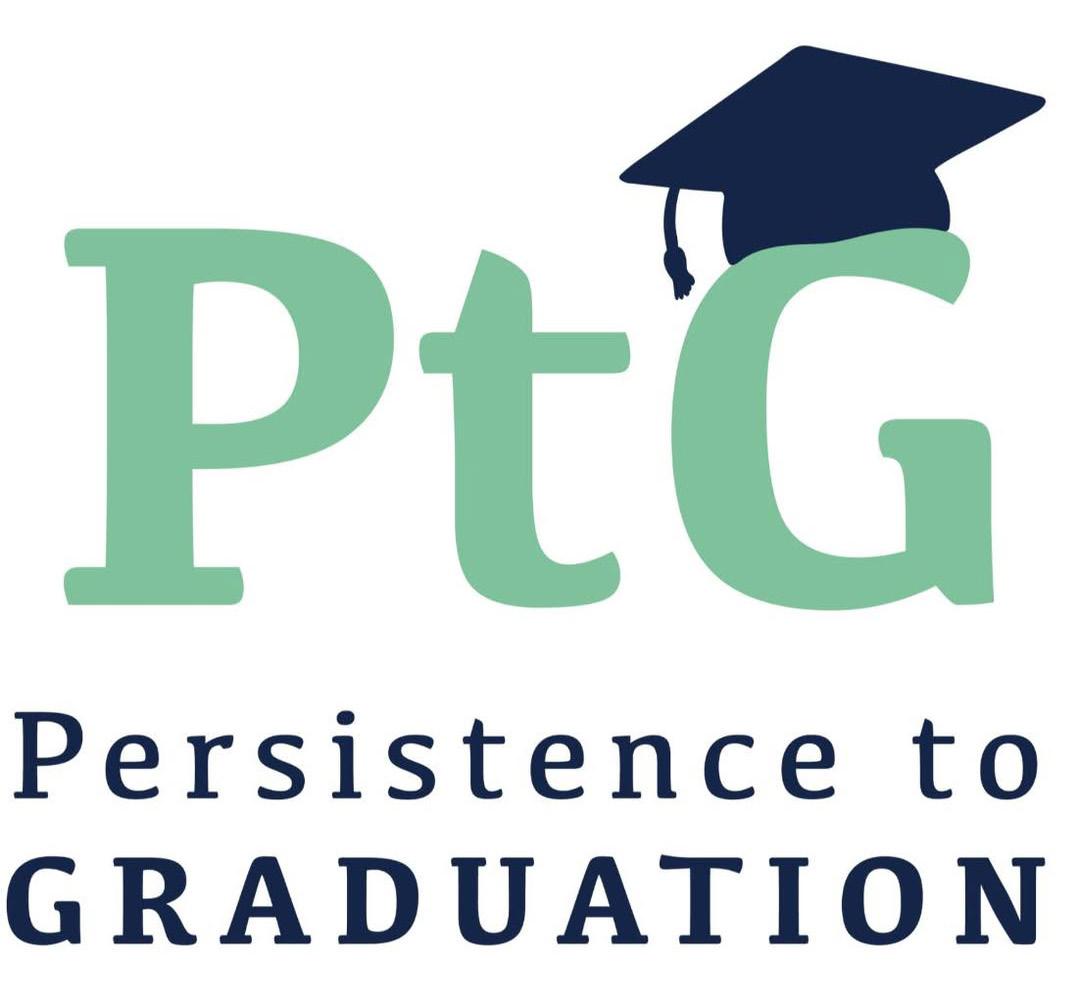
June 12-13, 2025
The Hilton in Downtown Lexington, KY
Hosted by the Kentucky Department of Education’s Division of Student Success (DSS)
https://site.pheedloop.com/event/2025PersistencetoGraduation/summary

Despite the amazing efforts of state agency programs across Kentucky to provide the best learning environment for their students, the reality of educational budgets often means that some supplies, technology, and projects that enhance learning aren’t feasible. In order to help this deficit for academic initiatives in currently-funded programs, KECSAC endeavors to make supplemental “special funds” available each year if there is an availability in the State Agency Children’s budget. This Special Allocation of Targeted Funds is intended to help programs implement projects designed to meet the significant academic achievement needs of the state agency children they serve.
What makes these targeted funding opportunities available is the fact that each year KECSAC earmarks a certain amount of State Agency Children Funds (SACF) to mitigate the impact should there be a mid-year state budget reduction. If the state does not issue any reductions during the spring legislative session, then some of these funds are funneled back to KECSAC programs as an increased per-child rate. Otherwise, all KECSAC educational programs are given the opportunity to apply for a “special allocation” for them to utilize in ways that will directly impact the achievement gap our students face. Sometimes funds also become available for special allocations if programs close during the academic year.
The KECSAC office began accepting applications from February 6 through March 4, 2025. By the deadline for submissions, 41 proposals from different KECSAC programs were received highlighting the use of varied projects and initiatives, including school supplies, technology for the classroom, textbooks, library books, science tools and curriculum, career and technical education supplies, music and art supplies, and much more. This year, each application was limited to $10,000 per program, and submissions outlined details, goals, and the impact of the project/initiative if it were awarded. The KECSAC team reviewed each proposal carefully based on the allowable criteria for funds, and this year all the requests received were funded partially or in total. All recipients of the targeted funds are also encouraged to report back to KECSAC the outcomes and successes of their projects.
You can review the list of KECSAC programs that received KECSAC’s Special Allocation of Targeted Funds and a very brief description of projects and supplies to be funded in the following table.
1 Adair County Adair YDC $5,000.00 Behavioral Incentives such as hygiene items and snacks.
2 Beechwood Independent Guardian Angel $8,000.00 Computer-based curriculum (Legends of Learning, Generation Genius, Amplify). Technology needs such as headphones and mobile white boards.
3 Bowling Green Independent Warren RJDC $8,000.00 The Beat of Life music program.
4 Bowling Green Independent Children's Crisis Stabilization Unit $8,000.00 Technology needs such as new Chromebooks and a Promethean Panel, etc.
5 Boyle County Boyle Co. Day Treatment $8,000.00 Cameras. New Chromebooks. Sets of class books. Student furniture.
6 Breathitt County Breathitt Learning Academy $8,000.00 ViewSonic smart board. 3D printer supplies.
7 Calloway County Calloway Co. Day Treatment $5,600.00 New Chromebooks. Microscopes for science class and prepared slides.
8 Campbell County Alexandria Educational Center $8,000.00
Hands-on project-based learning opportunities based around career opportunities and student interest.
9 Christian County Cumberland Hall School
10 Christian County Christian Co. Day Treatment
11 Corbin Independent Corbin Educational Center
12 Daviess County Owensboro Day Treatment
13 Elizabethtown Independent Glen Dale Center
14 Fayette County Audrey Grevious Center
15 Franklin County The Academy
16 Graves County Mayfield YDC
17 Hardin County Lincoln Trail Behavioral Health Systems
18 Hardin County Hardin Co. Day Treatment
19 Hopkins County Hopkins Co. Day Treatment
20 Jackson County Barnabas School
21 Jefferson County The Brook - KMI
22 Jessamine County All God's Children
23 Jessamine County Ashgrove Academy
24 Knox County Knox Learning Academy
25 Knox County Knox Appalachian School
26 LaRue County The Life Connection
27 Marshall County Purchase Youth Village
28 McCracken County McCracken Regional School
29 Menifee County Frenchburg Success Academy
30 Morgan County Woodsbend YDC
31 Nelson County Heartland Youth Village
32 Newport Independent Newport Regional School
33 Ohio County Ohio Co. Day Treatment
34 Pike County Pike Co. Day Treatment
$5,000.00
$10,000.00
$10,000.00
$8,000.00
$8,000.00
$6,000.00
$1,000.00
$5,000.00
$8,000.00
$8,000.00
$8,000.00
$8,000.00
$8,000.00
$5,000.00
$8,000.00
$8,000.00
$8,000.00
$9,430.00
$8,000.00
$8,000.00
$7,500.00
$8,000.00
$8,000.00
$8,000.00
$5,000.00
$5,000.00
35 Pulaski County Pulaski County Eagle Academy $4,661.34
36 Pulaski County Cumberland Adventure Program
37 Todd County Todd Co. Day Treatment
38 Warren County Warren Co. Day Treatment
39 Wayne County Lake Cumberland YDC
40 Wayne County Otter Creek Academy
41 Wolfe County Dessie Scott School
Total
Curriculum software platforms (Acellus, Moby Max, & Brain Pop). Remediation programs for math and reading. Professional development for staff.
Innovative, project-based learning platform TEQ iBlocks Sequences and necessary materials.
Two sets of ClassVR Premium virtual reality learning tools.
New Chromebooks. Art supplies. Cooking class supplies. Professional development for staff.
Outdoor garden supplies. Greenhouse project. New Chromebooks.
Library books and resources. Community partnership career program. Creation of calming area.
Wood burning hobby kits and supplies. Hands-on career kits. 3D printer supplies.
Student and classroom furniture. Vocational kits and supplies.
Promethean boards for teacher instruction. New computers.
Promethean Boards for teacher instruction. New computers.
Career simulation materials and technology. Professional development for staff.
Life skills education kitchen and laundry setup. Library books and audio books. Outdoor fitness equipment for physical education.
New library books and resources to increase diverse, inclusive, high-interest, and popular titles.
New Chromebooks for students and staff. Weight room physical education equipment.
Hands-on virtual reality career and science kits.
Life skills education project for food preparation and catering and necessary resources.
Life skills education kitchen classroom and supplies. Paxton Patterson Career Discovery Labs supplies.
New computers. Materials for speech and reading recovery.
Subscriptions for learning materials and online education software. School supplies and instructional materials. Guest speakers. Professional development for staff. Sensory materials.
New MacBook Air Computers.
Imagine Learning online classes. New Chromebooks. Small lockers for the classroom. STEAM activities. Professional development for staff.
Reading and MTSS specialist. Greenhouse project supplies. Materials and activities for blended learning.
New Chromebooks and technology resources. Behavioral program to be used for MTSS. Library resources.
Professional development for staff.
Online science curriculum. Literature workbooks. Professional development for staff.
Instructional software (IXL Learning, Renaissance STAR) and other online resources.
New computers. 3D pens for art instruction. PBIS program incentives.
$7,500.00
$2,500.00
$8,000.00
$8,000.00
$8,000.00
$8,638.00
$294,829.34
Educational field trips. Art supplies and community art instructor. Updated textbooks.
Support and professional development for staff.
New Chromebooks and technology resources.
Student computers and teacher workstations.
Sports Equipment for P.E. Class. Greenhouse and Gardening Supplies. A 75-inch TV on wheels. Art and 3D printer supplies.
Outdoor GaGa ball pit and safety equipment for life skills and physical education.
This Spring KECSAC’s
ongoing
professional
development
series
took
educators and partners to Louisville for a local study tour of alternative programs and to Boston, MA for a national tour.
On March 18, KECSAC leadership took a small but intentional cohort of KECSAC school administrators on a study tour of Jefferson County Public School programs. The group visited five state agency programs to learn about commonalities and differences among various educational settings. The first program visit was to Brooklawn Campus School. Brooklawn Campus, in operation since 1852, is a psychiatric residential treatment center and private childcare residential facility for youth in need of intensive therapeutic support. They serve up to 139 students. Staff at Brooklawn shared all of the innovative and extensive use of data in not only there program, but across all state agency children programs in JCPS. A tour of the campus enlightened visitors about ways to make a school inside of a treatment facility work and feel like a traditional and supportive school environment.
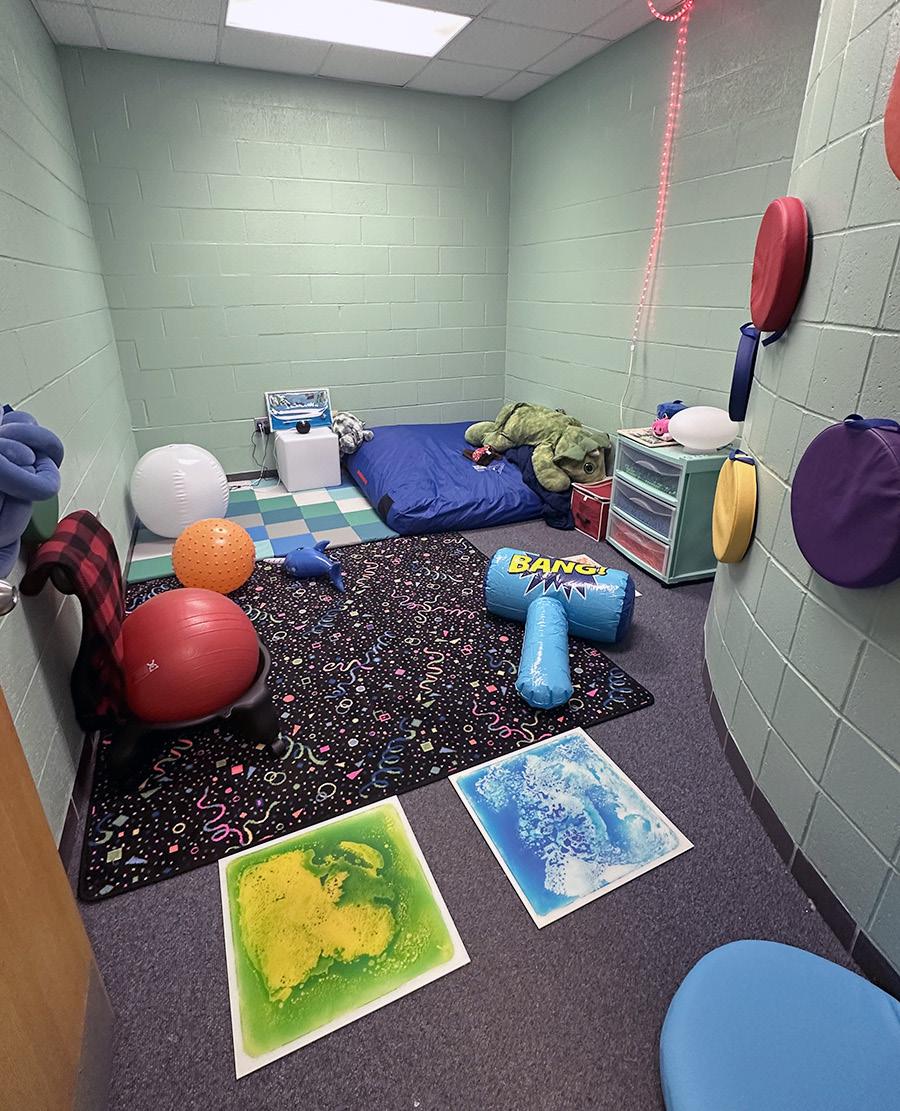
Next, the group traveled to Peace Academy. Peace Academy is the main educational component for youth receiving acute or long-term care at University of Louisville’s Peace Hospital programs, which is contracted with DCBS to provide services. The hospital also includes the Crossroads and Innovations educational components. They serve up to 216 students ranging in age from 3 to 21 years old. This visit showed the wide range of services and treatments that state agency students are receiving. The final visit of the day was to Home of the Innocents. Home of the Innocents (HOTI) is a DCBS-contracted, short-term comprehensive therapeutic program. It is designed to provide continued instruction for school-age children while they are patients at the hospital. This program provided yet another example of the intense needs of this vulnerable population of students and the dedicated educators who work diligently to meet those needs.
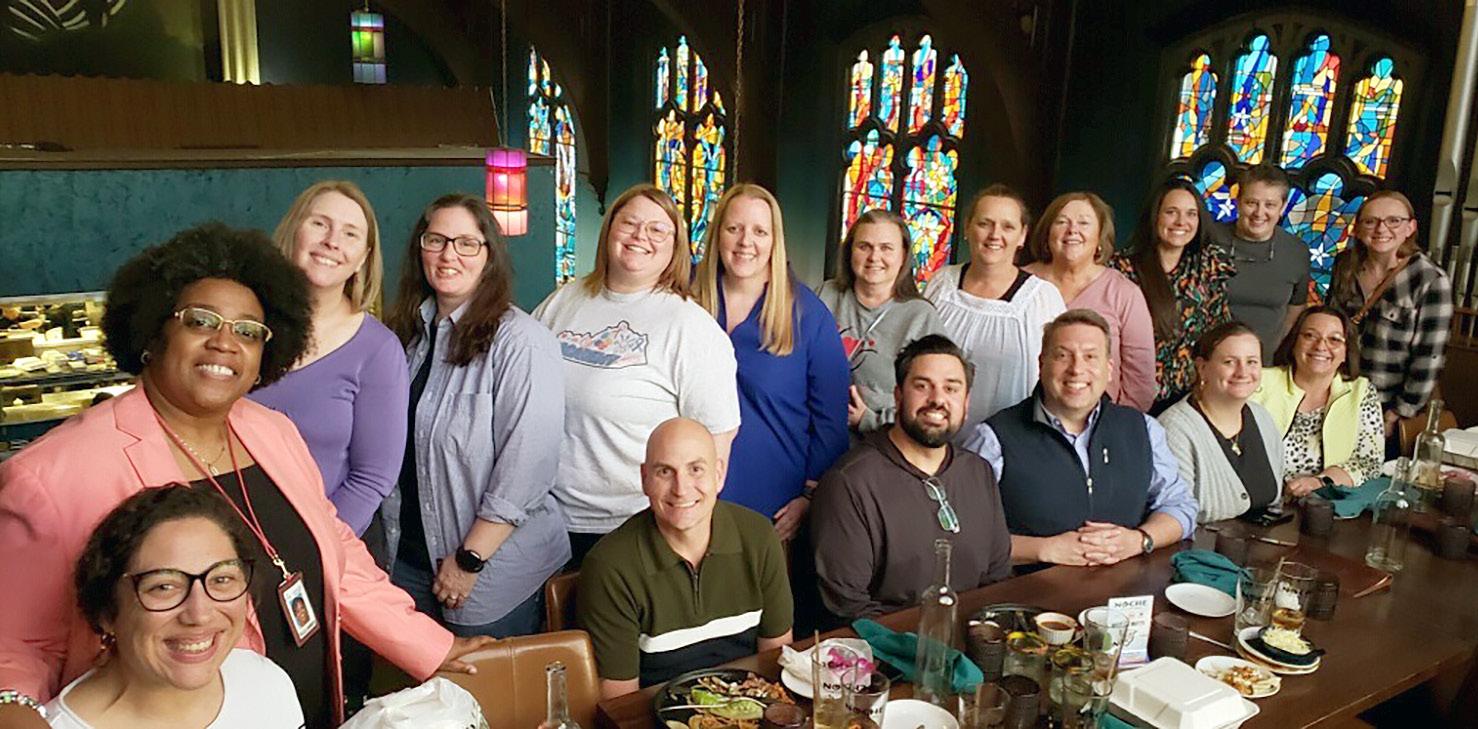
During the tour at Brooklawn Campus School, participants visited the newly designed meditation room where students and their therapist can address therapeutic and development needs.
The participants met that afternoon to discuss and document takeaways and observations from the day. They enjoyed dinner together and lodged in Louisville.
Day two of the study tour involved traveling to visit Western Day Treatment in Louisville, which serves up to 32 students. Western Day Treatment is a Mental Health Day Treatment established in 1999, which is a collaborative effort between Seven

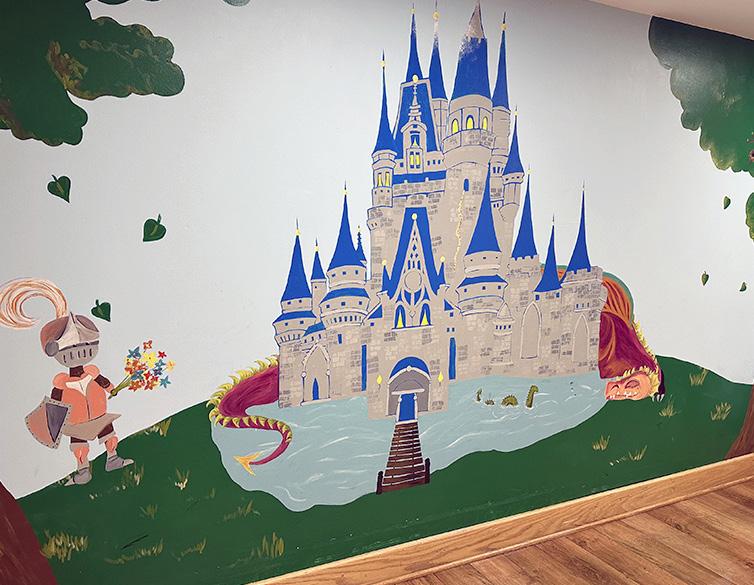
Left: The group kicked off the Louisville tour at Brooklawn School where School Administrator Justin Meek spoke about the student population there and how the school operates. Below: Murals at Peace Academy and Home of the Innocents create a bright and inviting atmosphere for students.

Counties Services and Jefferson County Public Schools. Leadership at Western Day Treatment showcased the importance of relationship building and school climate in working with students in need of therapeutic services along with academic interventions. Finally, the group was able to tour St. Joseph Children’s Home. St. Joseph Children’s Home is a DCBSlicensed residential treatment center that has been operating since 1850.The program serves up to 48 students and provides both traditional educational services as well as residential and therapeutic services. School administration explained the structure of the school day, and described the importance of using across-systems data to inform instruction.
KECSAC would like to thank the leadership and staff of each program we visited for hosting an insightful and educational tour of a sampling of the excellent programs in Louisville. Stay tuned for a future study tour near you in the future!
In April 2025, a team of school administrators and education leaders from Kentucky embarked on a four-day study tour in Boston, Massachusetts, designed to explore high-quality alternative education programs. Organized by the Kentucky Educational Collaborative for State Agency Children (KECSAC), the trip sought to provide insight into innovative education models that prioritize equity, personalization, and collaboration—particularly for students who face significant barriers to academic success, such as those in foster care, involved in the justice system, or living with disabilities.
The study tour kicked off with a warm welcome dinner at Hotel AKA Boston Commons, where participants gathered to discuss the objectives of the trip and set goals for their time in Boston. KECSAC leadership outlined the key themes of the tour, emphasizing the importance of learning from existing alternative education models to help improve outcomes for Kentucky’s most vulnerable students. The group was eager to dive into the site visits and discussions that would follow, knowing that these experiences would provide them with valuable insights for their work back home.
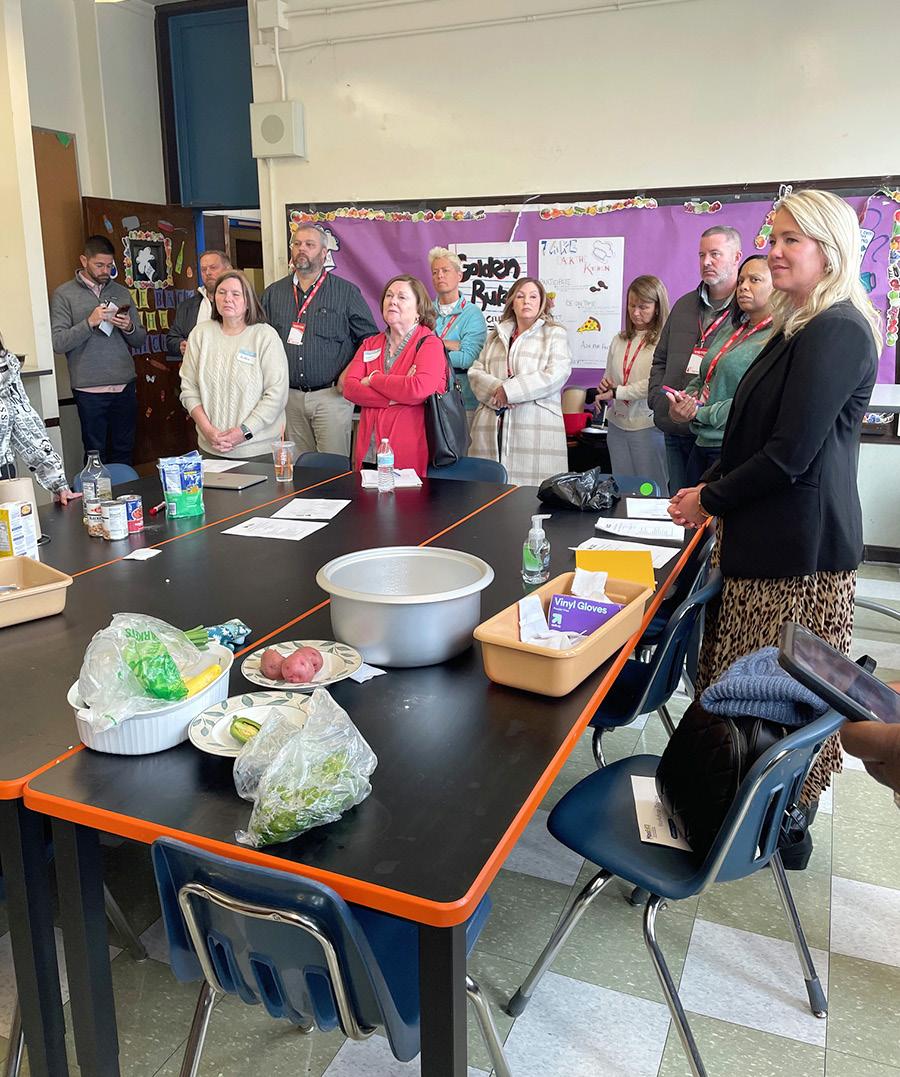
Educators and partners toured Boston Collaborative High School during their trip and saw a cross-curriculum projectbased classroom demonstration utilizing culinary arts and ELA.
The first full day of the tour began with a presentation from the Massachusetts Department of Education, which provided an in-depth look at the state’s system of alternative education. Attendees learned about innovative instructional strategies, accountability measures, and practices designed to support at-risk youth. This session set the stage for the visits to come, offering a framework for understanding the role that alternative education can play in meeting the needs of students who might otherwise fall through the cracks.
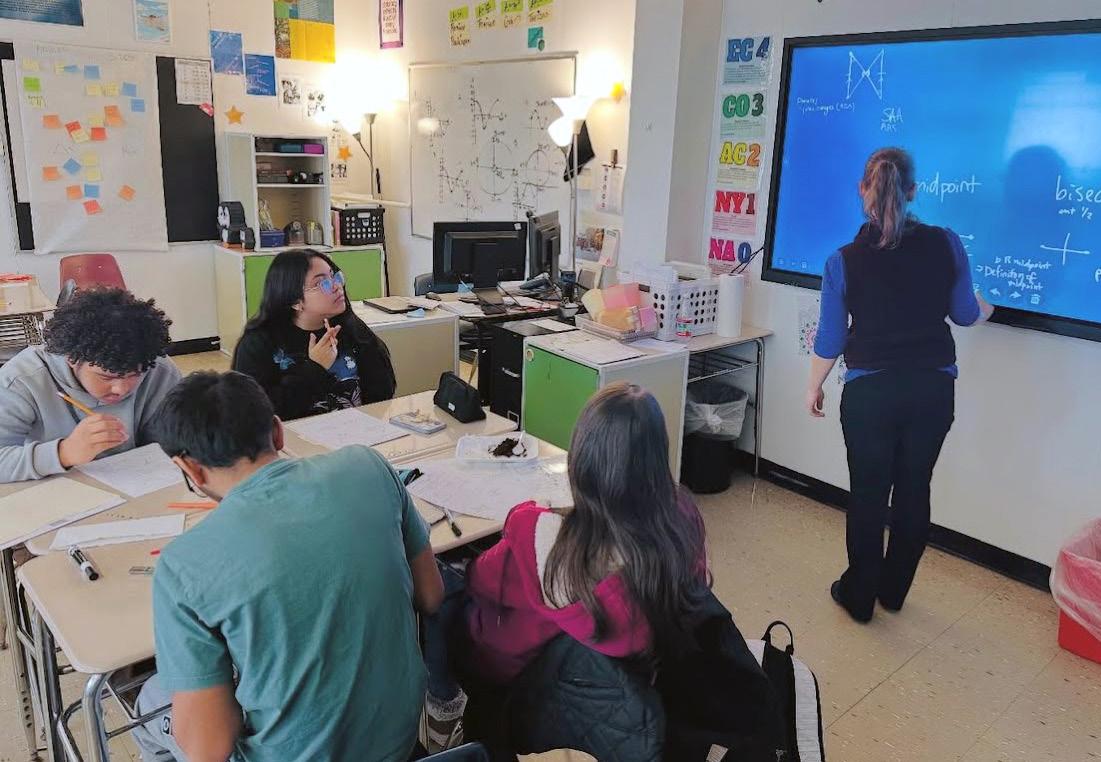
The group’s first school visit took them to Boston Collaborative High School, a unique institution that serves students aged 16–21 through three distinct programs tailored to different needs. These programs include LogOn Academy, which focuses on students who need to recover credits; Otro Camino, a program for recent immigrants; and St. Mary’s, which supports expectant and parenting young women. The school’s approach is a blend of online learning, project-based instruction, and traditional teaching methods, all designed to meet the individual needs of students. A student panel during lunch provided participants with firsthand accounts of the school’s impact. Hearing directly from students about their experiences highlighted the importance of creating personalized learning environments that empower students to take ownership of their education.
In the afternoon, the group visited two more schools located on the same campus in Dorchester: William J. Ostiguy High School and University High School. Ostiguy High School specializes in supporting students in recovery from substance abuse, integrating academic programming with life skills training to help students succeed both inside and outside of school. University High School, on the other hand, serves economically disadvantaged students and those who are at risk of dropping out. Both schools emphasized the need for trauma-informed care and flexible programming to ensure that students who face significant challenges have the support they need to thrive. These visits reinforced the importance of offering alternative pathways for students who might struggle in
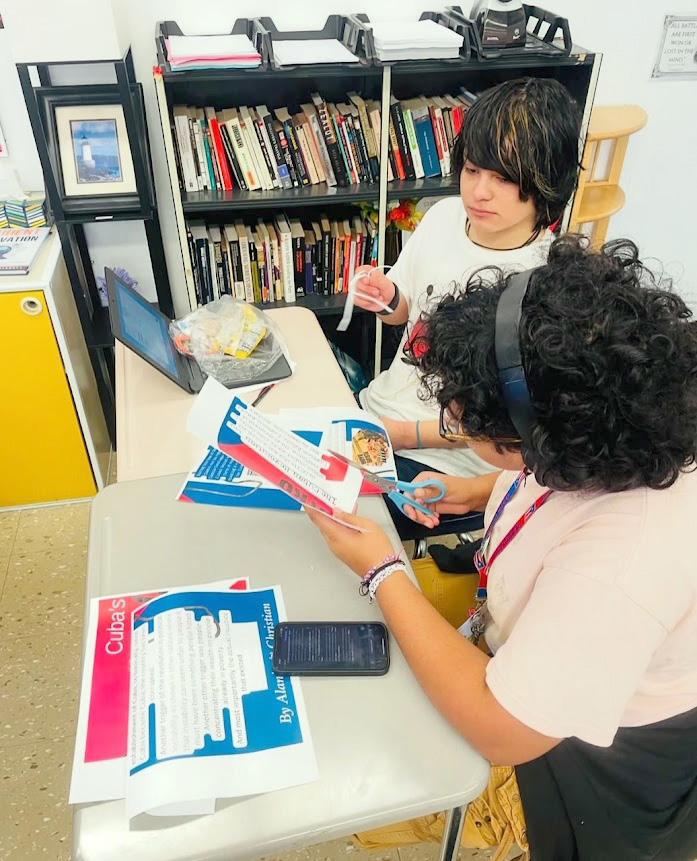
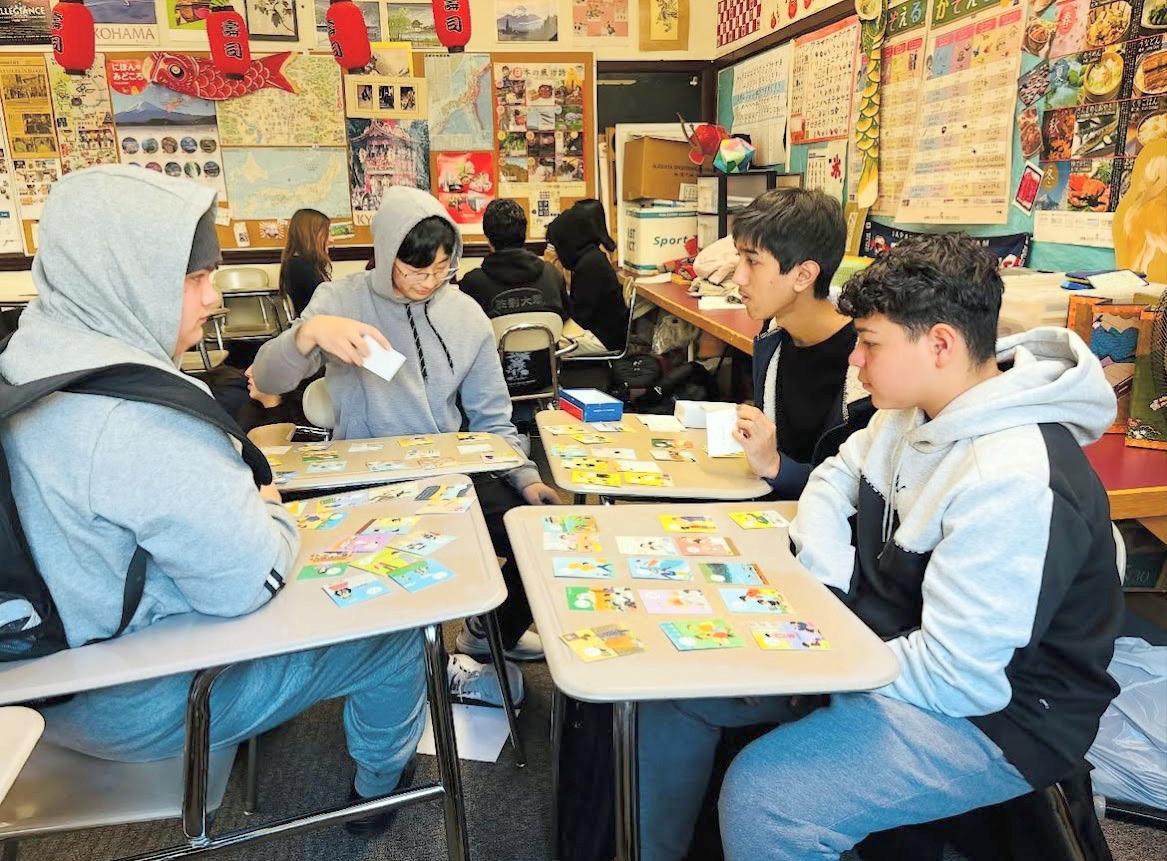
The group posed at Ostiguy High School with some students and staff during their tour. Ostiguy High School specializes in supporting students in recovery while also providing them with lifeskills.
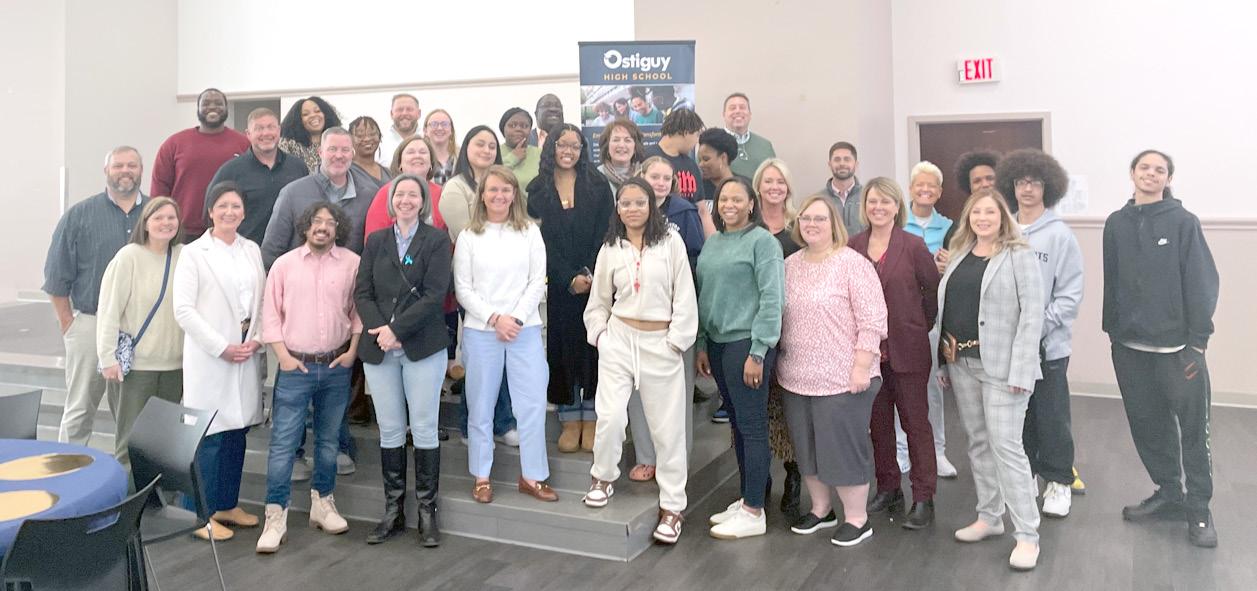
traditional educational settings.
The evening was free for participants to explore Boston, and many took the opportunity to stroll through the historic streets of the city, reflecting on the day’s visits. The following day would offer even more opportunities for learning and exploration.
On the third day, the group visited CityLab High School in Revere, MA, a relatively new school that focuses on design, technology, and creative problem-solving. CityLab offers a project-based curriculum that encourages students to engage in hands-on learning through studios and labs. Students are also offered early college and career pathways, ensuring that they are well-prepared for both postsecondary education and the workforce. The visit to CityLab was a powerful reminder of how innovation in education can help bridge the gap between academic learning and real-world application.
After a break for lunch, the group traveled to Salem, MA, where they explored the town’s rich history and its cultural connection to justice and societal issues. A visit to the Salem Witch Museum provided an immersive look into the 1692 witch trials, offering valuable lessons about the dangers of mass hysteria and the importance of critical thinking. The museum’s second exhibit, which focused on the evolution of the perception of witches over time, provided an insightful historical context for understanding how societal narratives shape our views on justice and persecution. The museum visit was a powerful reflection on the ways that historical events continue to influence contemporary issues, including education and the treatment of marginalized groups.
The evening ended with dinner at The Tavern in the historic Hawthorne Hotel, followed by a guided walking tour of Salem’s darker side. The Mysteries & Murders of Salem tour retold chilling stories of crime and justice from the town’s past, offering a slightly macabre yet compelling look at the role of power and public perception in shaping history. This experience brought a thought-provoking end to the day, as participants reflected on the ways that these historical lessons might inform their work with vulnerable students.
On the final day, participants had a debriefing session, where they reflected on the many lessons they had learned during their time in Boston. Armed with new ideas and strategies, the group returned to Kentucky inspired and ready to apply what they had learned to their own work, with the goal of improving educational opportunities for all students, especially those most at risk.
The Boston Study Tour provided a rich, immersive experience that allowed Kentucky’s education leaders to explore innovative practices and policies designed to support at-risk students. From personalized learning approaches to cross-system collaboration, the tour reinforced the idea that all students—regardless of their backgrounds or challenges—deserve high-quality, equitable educational opportunities. By drawing inspiration from the best practices observed in Boston, participants left the tour with a renewed commitment to fostering student success and making a difference in the lives of Kentucky’s most vulnerable learners.
As technology has advanced through the years, online learning has provided students and educators with numerous benefits. Whether it’s to supplement classroom learning, work at their own pace, or complete credit recovery, online curriculum programs offer that flexibility for students. These programs also offer an alternative to traditional classroom instruction that can be difficult in some KECSAC programs due to the nature of how the classroom is structured and what the student population looks like.
Although virtual learning is an innovative tool it is imperative that fidelity of instruction is being preserved while using these online learning platforms. Ensuring the critical components of a program are present and delivered in a consistent and reliable manner is crucial for the best outcomes. Best practices in education also dictates that students should be pacing through material adequately, ensuring a balance between the amount of information presented and the time allotted for learning. Effective pacing in online courses is key for student success, as it impacts learning outcomes and overall course experience. Pacing in online learning also helps students retain information, keeps students engaged and motivated as they make progress, and reduces stress associated with feeling overwhelmed by content or deadlines.
While online learning can present challenges regarding effective pacing there are many strategies that can help preserve fidelity of instruction and the academic integrity of online lessons. Below is a list of tips and tricks to help students learn at an appropriate pace, get on track, and achieve success in their virtual learning.
3
Require note taking during instruction. This enhances memory retention, improves focus and engagement, and facilitates better organization and review of material.
Develop a policy concerning what is required if a failing grade is earned on each lesson and assessment. If the initial grade is below 60%, efforts should be made to determine the reason for the grade and adjustments should be made to ensure the student has the information necessary to master the concepts.
5
Monitor and encourage appropriate student pace for learning. For example, Edmentum allows teachers to monitor student pacing with categories like ahead of pace, on pace, slightly off pace, and off pace. Edgenuity allows teachers to monitor engagement and idle time.
Assign an additional project or coursework relating to the online lesson.
Be mindful and make students aware of the time frame for course completion recommended by the online learning platform being used. Create timelines or calendars that clearly map out expectations for pacing.
2
Ensure students are actively engaged during the instructional portion of the online lessons. Time spent on each lesson should be equitable to what students in an A1 class would experience. For example, the online learning platform Edmentum recommends students should spend about 53 minutes in each course daily in order to complete the it on time. The platform Edgenuity recommends 50 to 60 minutes for each lesson daily for grades 6-12.
4
Ensure that shortcuts aren’t being utilized. For example, there are highlighting and word search tools in online learning platforms that allow students to bypass reading passages. External shortcuts such as “answer websites” should not be used either.
6
9
Efforts should be taken to reduce distractions and workarounds that can derail adequate pacing such as:
•Looking up answers online
•Allowing too many retakes on lessons
•Completing multiple assignments in one day
•Inattentiveness (music, working ahead, no notes, etc.)
Incorporate portions of direct instruction (i.e. bell ringers) covering over arching topics of the online lesson and add those grades to the online platform grades.
8
Department of Juvenile Justice programs across the state excel at providing vocational offerings to students, and DJJ Welding instructor Gordon Judd is doing his part to expand the vocational knowledge of students with his mobile virtual reality welding class. Mr. Judd was previously the welding instructor at Jefferson Regional Juvenile Detention Center, but when the program closed last fall due to renovations, he took his expertise and virtual welding equipment on the road. Mr. Judd has been to seven DJJ programs across the state since the beginning of the school year that he keeps on a rotation and has even taken his course to a DCBS program, with plans to visit more.
The course Mr. Judd teaches uses virtual reality technology to create an immersive and hyper-realistic environment where students can practice realworld welding skills without actually using real equipment. There are many benefits to a virtual welding class as well, including safety concerns, and fear of the welding torch.

Above: DJJ Welding Instructor Gordon Judd helps a student at Northern KY YDC learn about welding through a virtual reality platform. Below: Students practice the welding techniques they’ve learned in a safe environment.
“You’d be surprised how many students are hesitant or afraid of the oxy-acetylene torch we use since it is so hot and can be dangerous, so the virtual module takes that obstacle out of the equation,” Judd said.
The virtual module introduces students to all the terminology and equipment in real welding, but also fundamental welding techniques, proper machine setup, and welding parameters (like gas flow, amperage, and voltage) in a safe, controlled environment.
Virtual welding is safer since there is no need to set up the welding environment safely to protect against exposure to fumes and gases, burns, electric shock, and potential for fire, among other hazards. However, students learn about these hazards and the appropriate and safe methods to operate the equipment, as well as learning about personal protective equipment (PPE) and safety practices.
This class also gives students a chance to experience other avenues in a career once they leave school. Mr. Judd hopes that students take away an appreciation for a vocation that pays very well, and is a option for students who may have a background that limits their future options.
“I don’t want students to think their life is over once they leave our programs, I want them to know there are different avenues they can take in life that will help them be successful as an adult” Judd said.
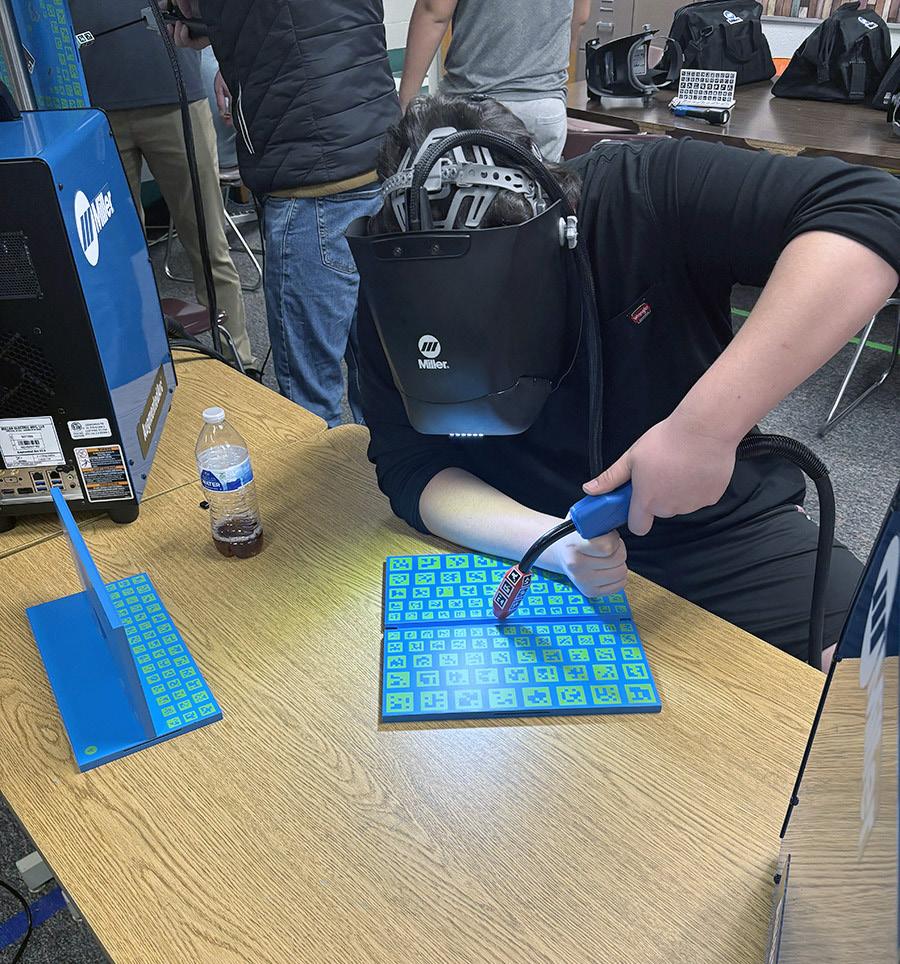
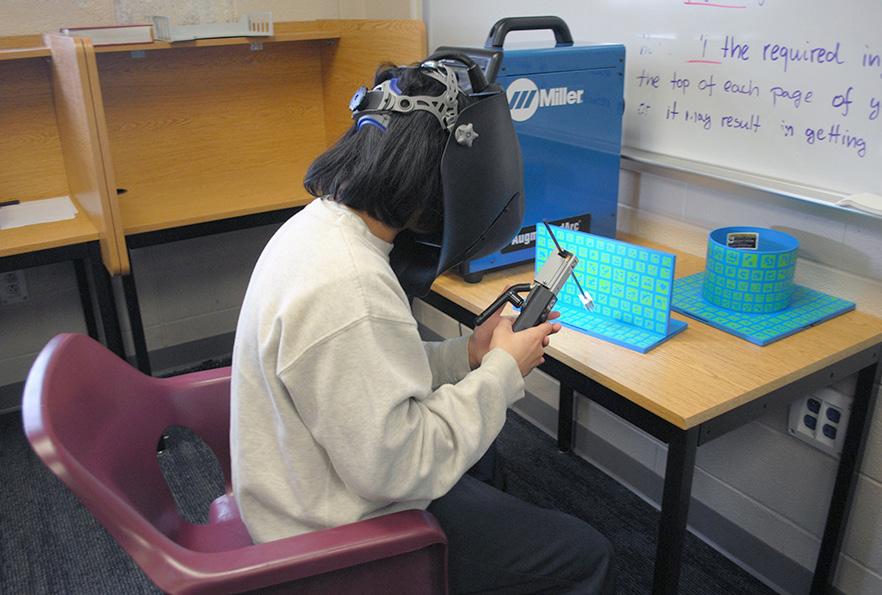
Currently Mr. Judd will visit a program for one day and teach an introduction to welding curriculum as well using the virtual equipment, and while there is not a certification that comes with the class, he is working to incorporate a test of knowledge and certificate of completion for those who master the class.

Dessie Scott Students get the opportunity to have physical education classes using their new outdoor adaptive workout equipment.

Dessie Scott made exciting use of their 2024 KECSAC Special Allocation of Targeted Funds by building an outdoor playground and fitness equipment area designed for adaptive use for students with physical limitations. This new space features inclusive, playground-level equipment that supports physical education by promoting balance, hand-eye coordination, social skills, and teamwork among students. Beyond PE classes, the area also serves as a positive space for student rewards and after school recreation, providing opportunities for both fun and development in a safe, engaging environment.
Warren County Day Treatment recently partnered with Light of Chance, a local nonprofit organization dedicated to empowering youth and communities through innovative arts and wellness programs since 2005. Together, they coordinated engaging sessions focused on selfregulation and self-awareness—two crucial skills for personal growth. Students explored emotional intelligence through expressive Emotions Masks, creatively illustrating the complexity of identifying and owning their feelings. In addition, a Light of Chance Culinary Instructor visited the program to lead a handson cooking lesson, where students learned how to prepare a delicious meal while building life skills and confidence in the kitchen.

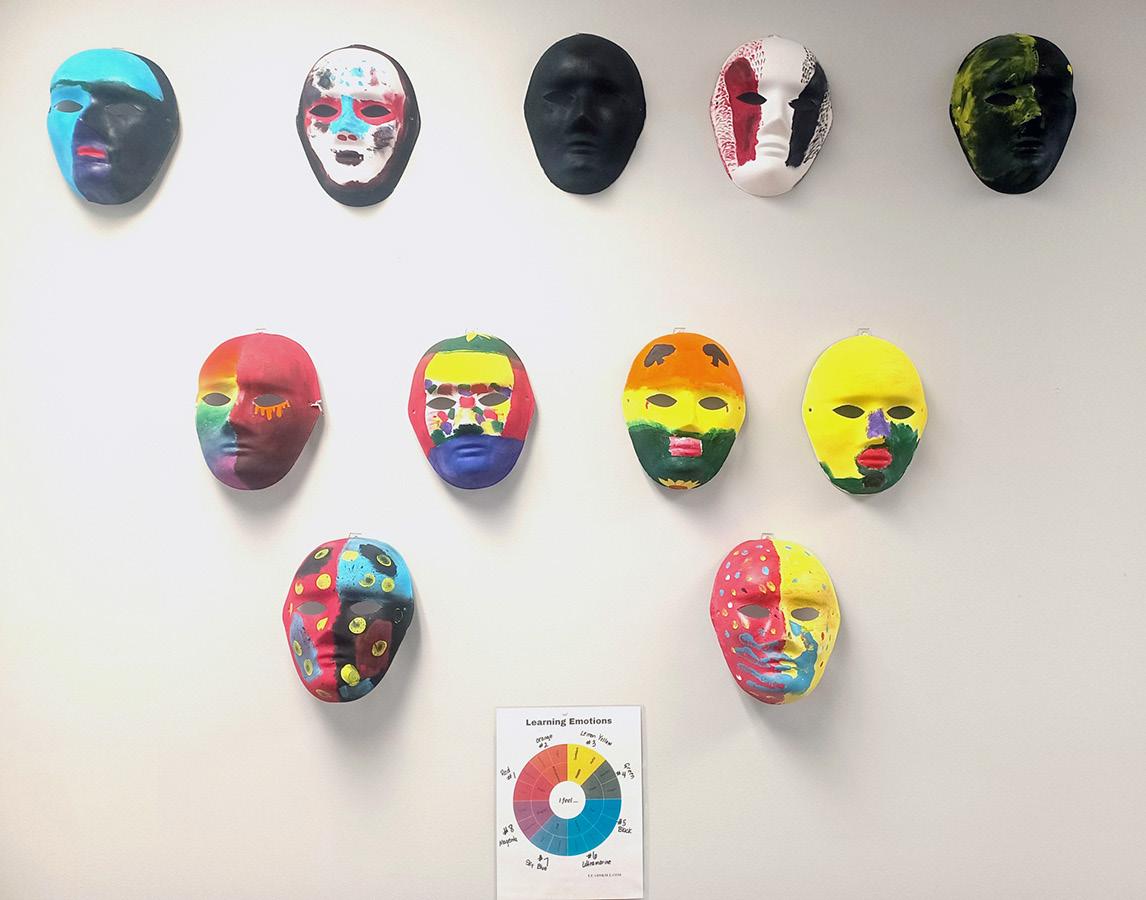


Over the past several years, Knox Appalachian School has used their KECSAC Special Allocation of Targeted Funds to create a more engaging and supportive learning environment through exciting student-focused incentives.
With these funds, the school has built a movie room, complete with a popcorn and cotton candy machine. This incentive is used for rewarding student behavior and good grades. There is also a fully equipped workout room, offering students fun and healthy ways to relax and recharge. The workout room is also used for physical education classes. Additionally, enhancements to the school library have expanded access to educational resources and encouraged a love of reading. These additions reflect the school’s commitment to student well-being, motivation, and academic success.
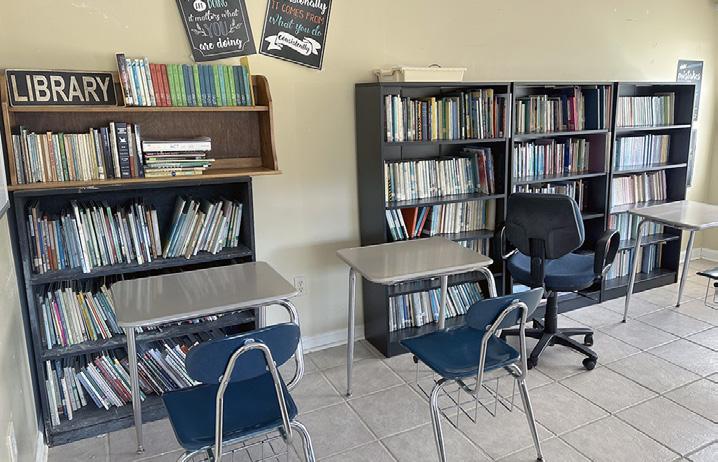
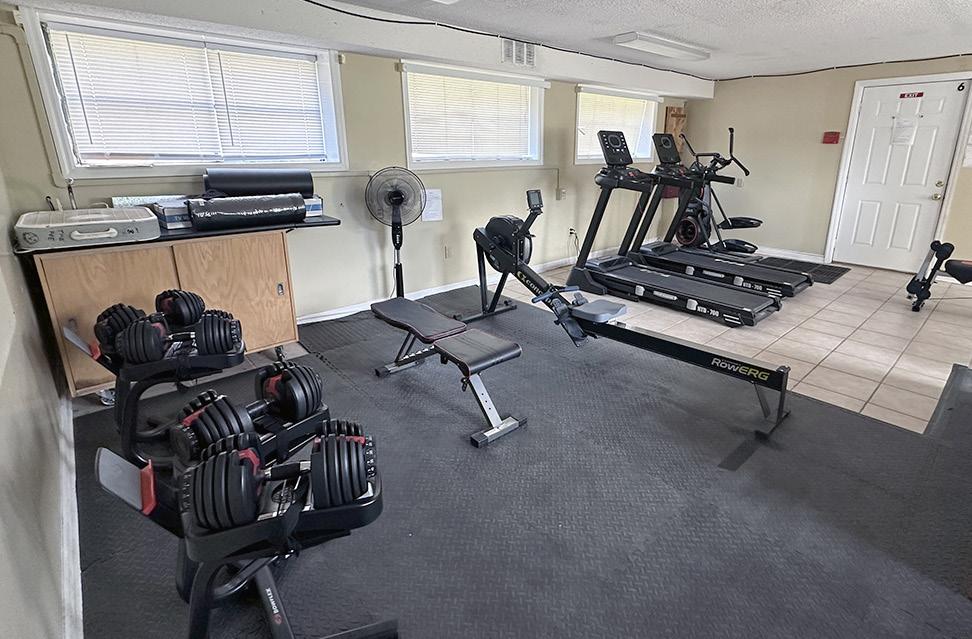
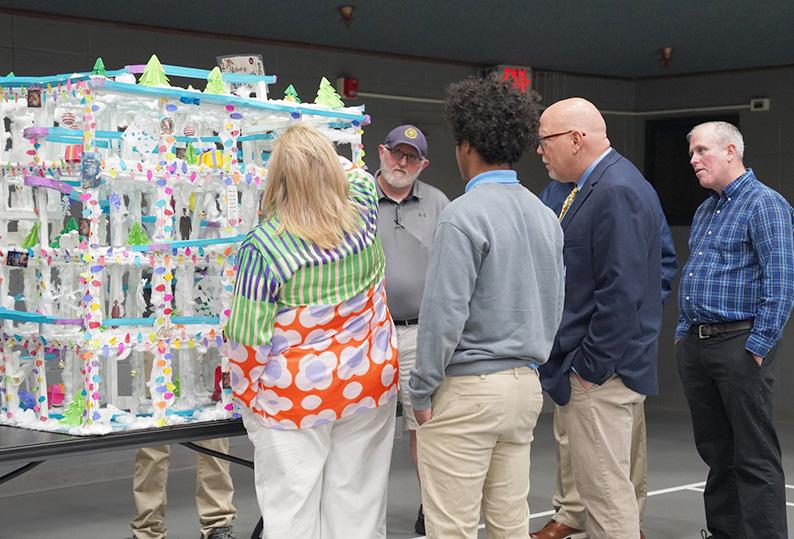
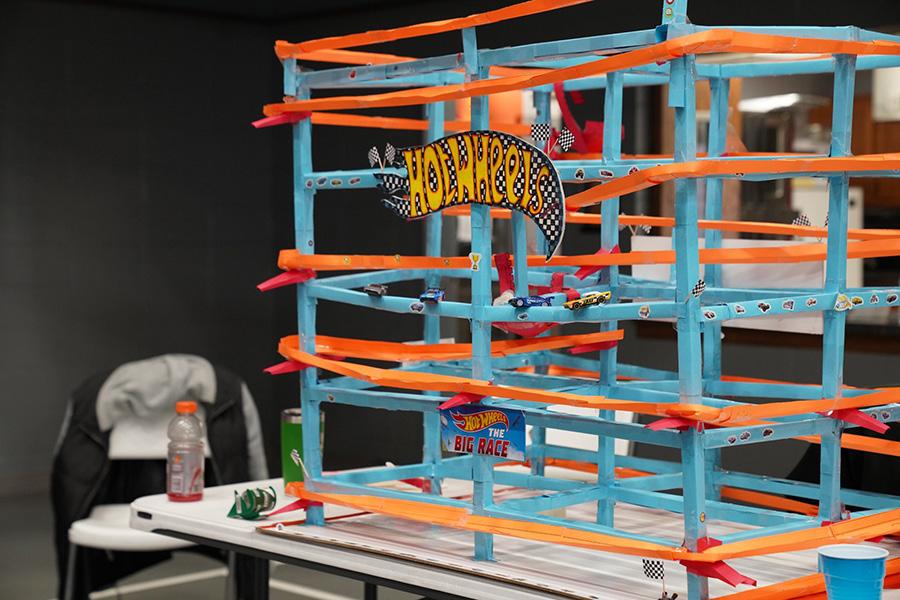
DJJ’s Education Branch hosted the 3rd Annual Paper Roller Coaster Competition on April 29, 2025. The initiative challenges program students in all grades to design and build the cheapest, fastest, and tallest paper roller coaster. Inspired by the life and inventions of engineer Granville T. Woods, this project combines STEM education with career readiness and social emotional learning. Students work in teams to explore job applications, apply engineering principles, and showcase essential life skills such as collaboration, problem-solving, and innovation. The vibrant learning experience culminates in a statewide competition where teams present their roller coasters and discuss their learning journey. Overall nine programs participated in person and virtually. First place went to “Pirates of the Caribbean” from Ascension Day Treatment in Shelby County, second place went to “Hot Wheels” from Lake Cumberland YDC, and third place went to “Polar Express” from Jackson Group Home/Breathitt Co. Day Treatment. Congratulations to all the winners and all who participated!
In an inspiring display of creativity and resilience, artwork created by youth at Warren and Fayette Regional Juvenile Detention Centers is now featured in the “HeARTs Behind the Violence” exhibit. It’s presented at the Capitol BG in Bowling Green, KY, a historic landmark managed by Warren County Public Library, providing a fitting backdrop for this moving exhibit. This powerful showcase was made possible through a partnership with On The Move Art Studio , which is a nonprofit mobile art room created in a refurbished vintage trailer that travels to underserved neighborhoods to host free arts classes for kids in Central Kentucky. The exhibit highlights the remarkable talent of young individuals who have turned to art as a meaningful outlet for personal expression. Each piece tells a unique story, reflecting both the challenges and hopes of its creator. We are proud to see these voices honored in such a significant and public way as it is a powerful reminder of the resilience and creativity of the youth we serve.
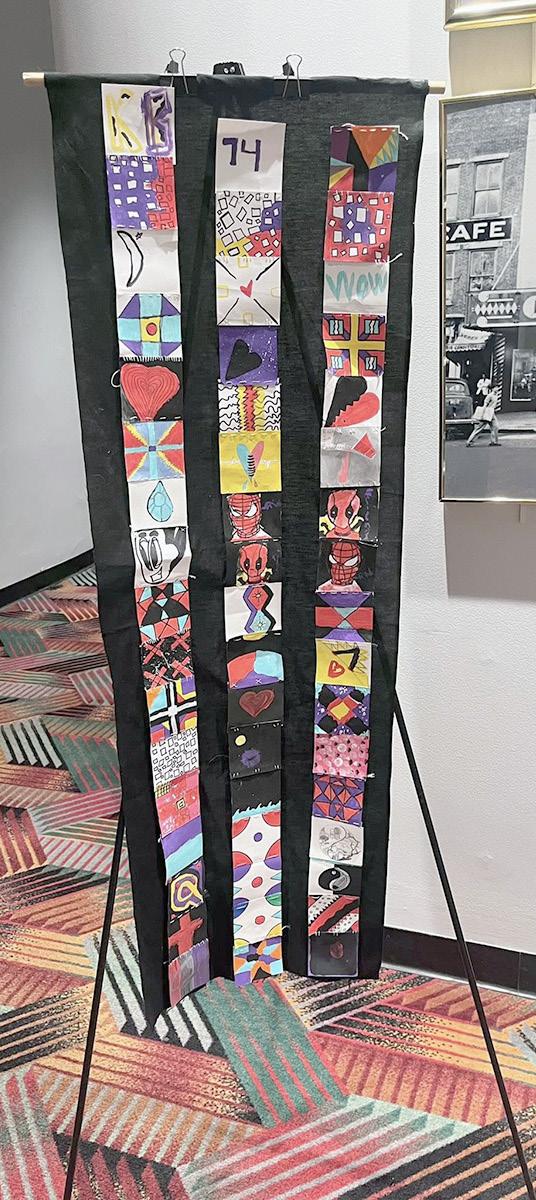
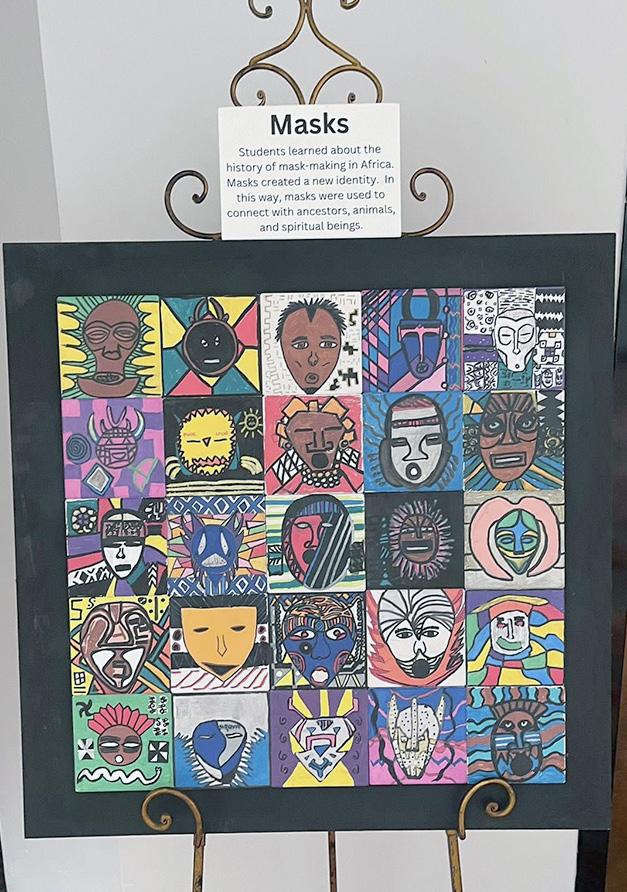

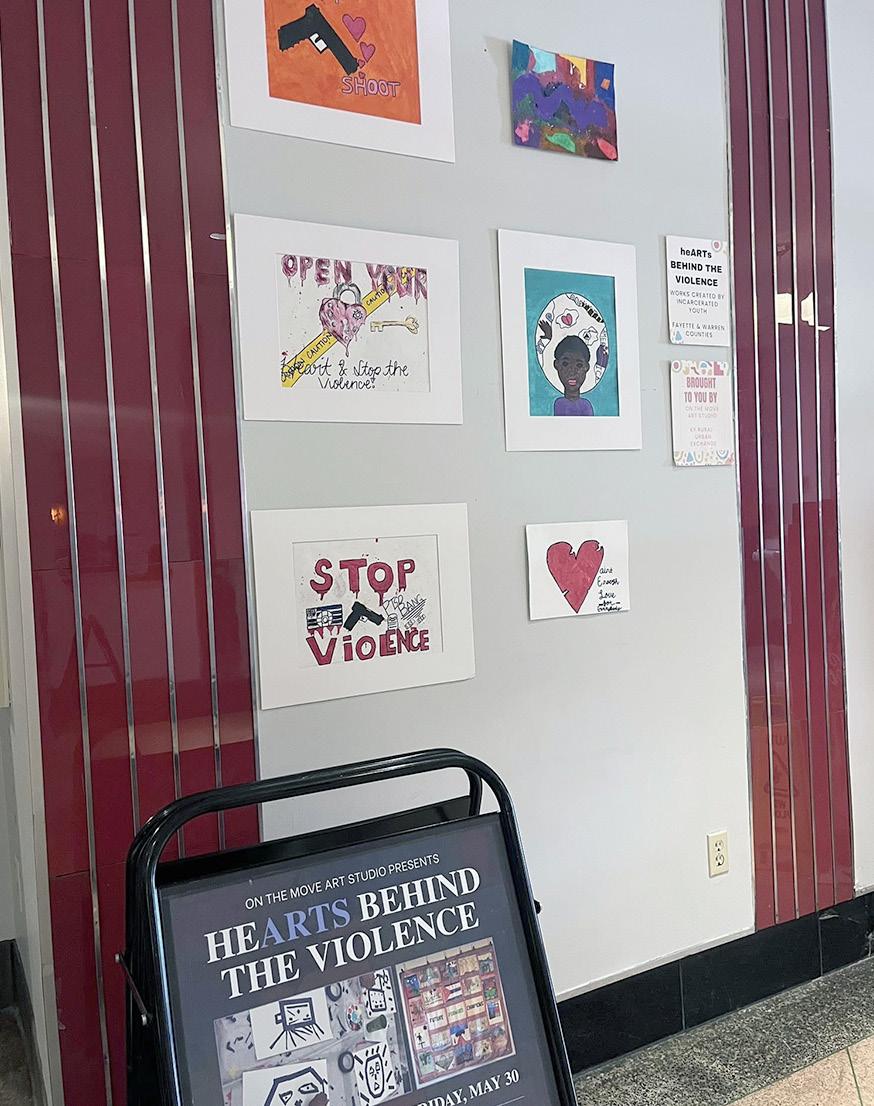
Various art from students at Fayette and Warren Regional Juvenile Detention Centers is now on display at the Capitol BG in Bowling Green in the “HeARTs Behind the Violence” exhibit.
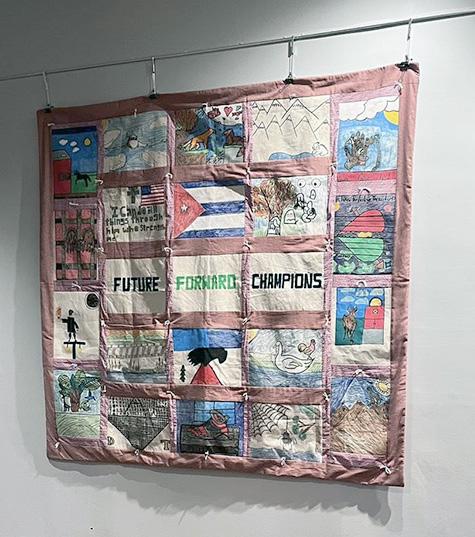
Kentucky Educational Collaborative for State Agency Children
260 Democrat Drive Frankfort, KY 40601 (502) 783-1443
Kentucky Educational Collaborative for State Agency Children’s Newslet ter